Notes
Girls Gone Mad: the Wild-Eyed Lunacy of Bachmann, Palin, Pelosi, Clinton . . . Etc.
The image accompanying a recent Rolling Stone profile of Michele Bachmann and her presidential prospects casts her as a wild-eyed crusader whose homicidal mission is undertaken with manic zeal. The article refers to Bachmann’s brain as “a raging electrical storm of divine visions and paranoid delusions,” and it features a link to a slide show of “Michele Bachmann’s Craziest Moments.” I’m no Bachmann apologist, but I am concerned about a troubling trend in which political women are critiqued as crackpots and lambasted as lunatics. This approach relies on a specific set of visual cues that are applied to women of various ages and ethnicities across political parties.
The first and most significant feature of political “girls gone mad” is their bulging eyeballs. Eyebrows stretched to unnatural limits frame eyes that protrude with either rage or glee. As the “windows to the soul,” eyes are particularly important markers of character and credibility. When exaggerated expressions are captured in journalistic photographs and video stills, the implication is that the camera has uncovered the “true” nature of the subject—the unruly woman who exists under the veneer of conventional beauty or disciplined experience. The frenetic expression belies the political female’s authentic self.
The version of Bachmann created by the Rolling Stone artist has been deployed in other contexts. Consider the following stills culled from a broadcast of MSNBC’s Hardball. The first shot appeared in a Huffington Post article that described Bachmann as a “saucer-eyed looneytune.” Conversely, however, the Minnesota StarTribune featured a still taken from the same interview in which Bachmann looks normal. The article that accompanied that photo referred to controversy over Bachmann’s political statements and views but stopped short of dismissing her as deranged. In this case, the images function as tacit character witnesses—testifying both for and against Bachmann.
The reason that the image of a crazed female politician is so powerful, and powerfully dangerous, is because it stems from a much older story about women. Whether burning them as witches or dismissing them as bitches, Western culture has always disciplined women who transgress established societal and political boundaries. One way in which this discipline has historically been meted out has been to classify women who resist traditional roles and boundaries as insane (or possessed) and burn them at the stake (18th century), consign them to sanitoriums (19th century), or encourage them to self-medicate with alcohol and anti-depressants (20th century). During the 18th and early 19th centuries, women were widely regarded as incapable of the rational thought required for democratic deliberation and, thus, denied the right to vote. Nearly 100 years after women won the right to vote in the U.S., female politicians are still trying to prove that they’re sane enough to be trusted in high office. Those with presidential aspirations are particularly vulnerable to being depicted as crazy—and not just run-of-the mill crazy. Both Bachmann and Sarah Palin have been denounced as “batshit crazy” and the corresponding images bear the distinctive markings of female political psychosis: bulging eyes, gaping mouths, exaggerated expressions, and uncontrolled fury or glee:
Women candidates are not the only ones derided as deranged. One blogger serialized the “wide-eyed zealotry” of conservative pundit Michelle Malkin, including the following two screen shots in his pictorial representation of the “Full-On Crazyface” that ostensibly characterized her 2009 book tour. Even Glenn Beck looks composed next to her.
Of course, some liberal audiences may not be too bothered by the preceding depictions of three women who routinely make specious arguments. Yet the “crazy” frame is becoming a shorthand indictment of women political figures from both sides of the aisle. Consider these three images of Michelle Obama, Nancy Pelosi, and Hillary Clinton:
All three photos invoke societal anxieties about a female influence on presidential power—whether once removed (in the case of Michelle Obama) or direct. A “Bat Shit Crazy” Nancy Pelosi was only “Two Heartbeats Away from Being President” when she was Speaker of the House, and Hillary Clinton was inappropriate both as a political spouse and a presidential candidate. When Democratic insiders lamented her refusal to cede the Democratic presidential nomination to Barack Obama, they compared her to Glenn Close’s character in Fatal Attraction—just another crazy lady who doesn’t know when to quit.
What is particularly disturbing about all of the preceding images is that when placed in context in the blogosphere, they don’t stand out as abnormal. The image of the unruly woman politician is normalized by the constant barrage of images like these—photos and cartoons that remind us that all women are on the verge of a nervous breakdown. Not only do the photos seem more normal and authentic than the polished and posed photos on candidate websites, the gross depictions of uncontained female emotions give many audience members pleasure—they’re a funny comeuppance to uppity political women.
Attacking female politicians by making them look crazy is bad politics and bad strategy. It levies an argument every bit as specious as the positions the images are designed to critique, and it does so in a way that perpetuates outdated stereotypes about political women. At least, that’s my take on it. But, then again, maybe I’m crazy.
— Karrin Anderson
(Image credits and sources: Bachmann drawing: Image by Victor Juhasz/Rolling Stone; Bachmann Hardball screen grab: HuffPost; Bachmann Harball screen grab 2: StarTribune; Bachman “Batshit Crazy”: Image by PunditKitchen.com via PoliticalTramp; Bachmann and Batboy: (no image credit) via MaxDad; Bachmann for President demotivational poster via eforwards; Palin demotivational poster: Image by zirgar.blogspot.com; Many crazy faces of Michelle Malkin via Oliver Willis; Michelle Obama: Image credit FunnyObamas.com; Pelosi demotivational poster: original source (archived image/link no longer live) motivatedphotos.com; Clinton: no credit available via nicedeb.)
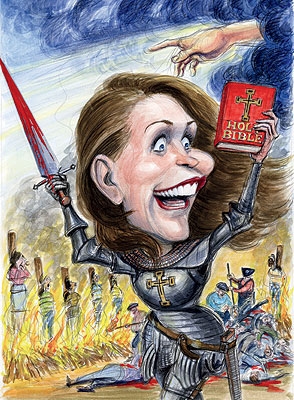
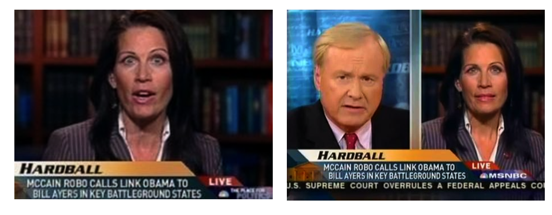
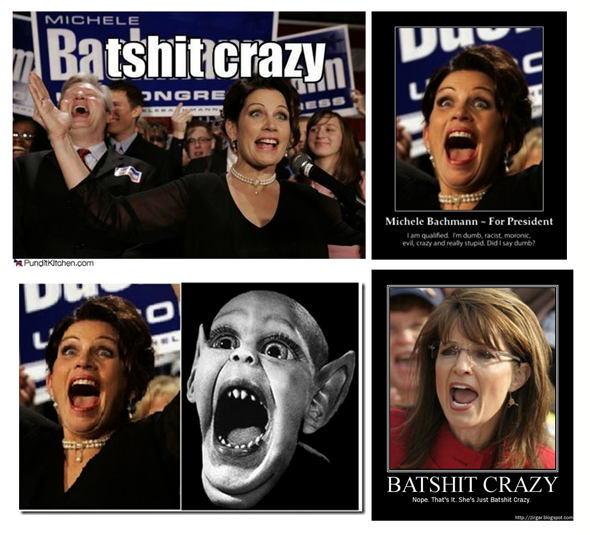
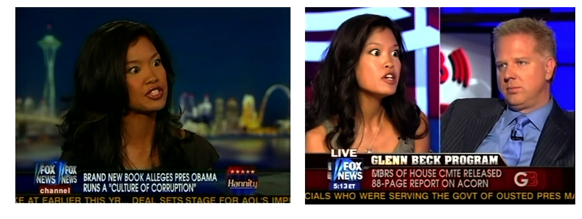
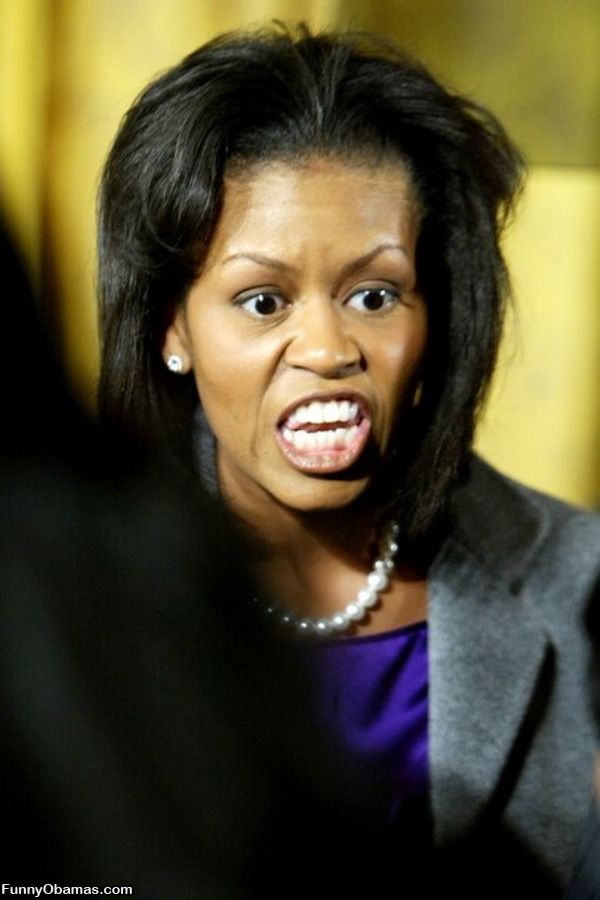
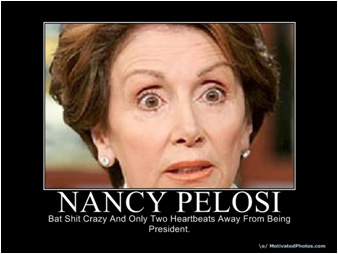
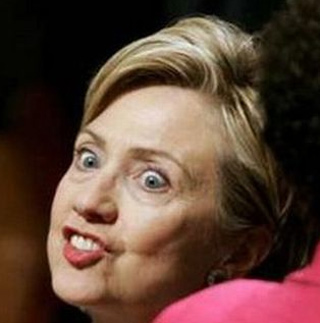
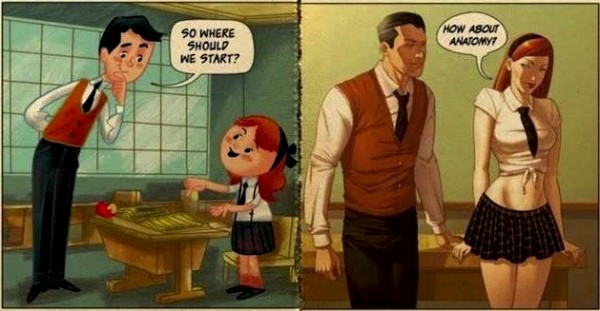
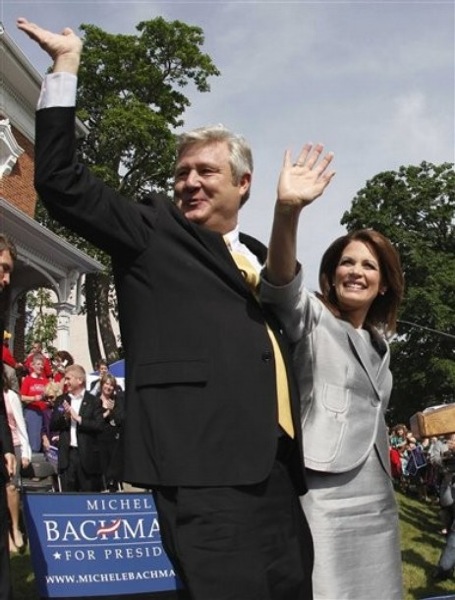
Reactions
Comments Powered by Disqus